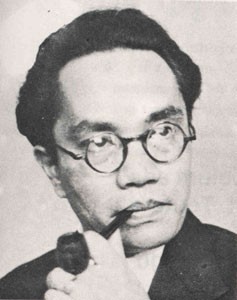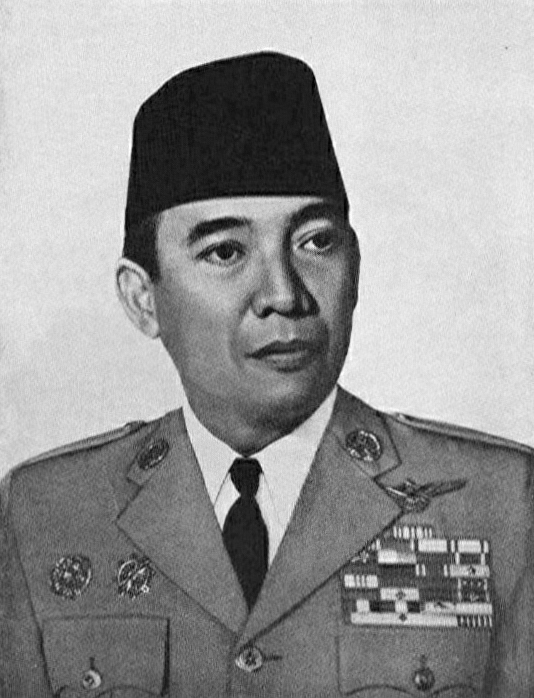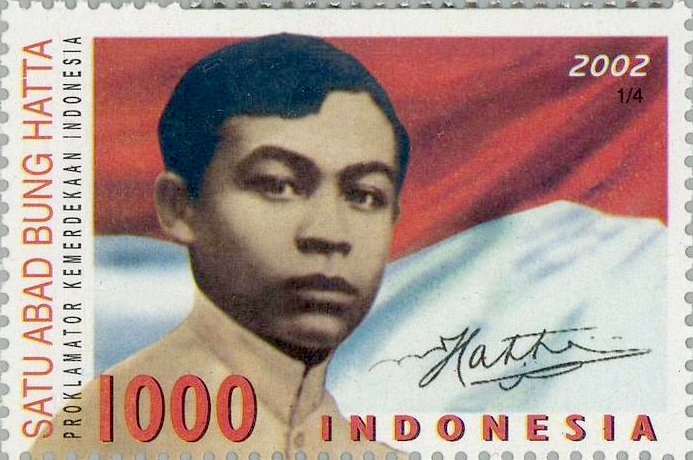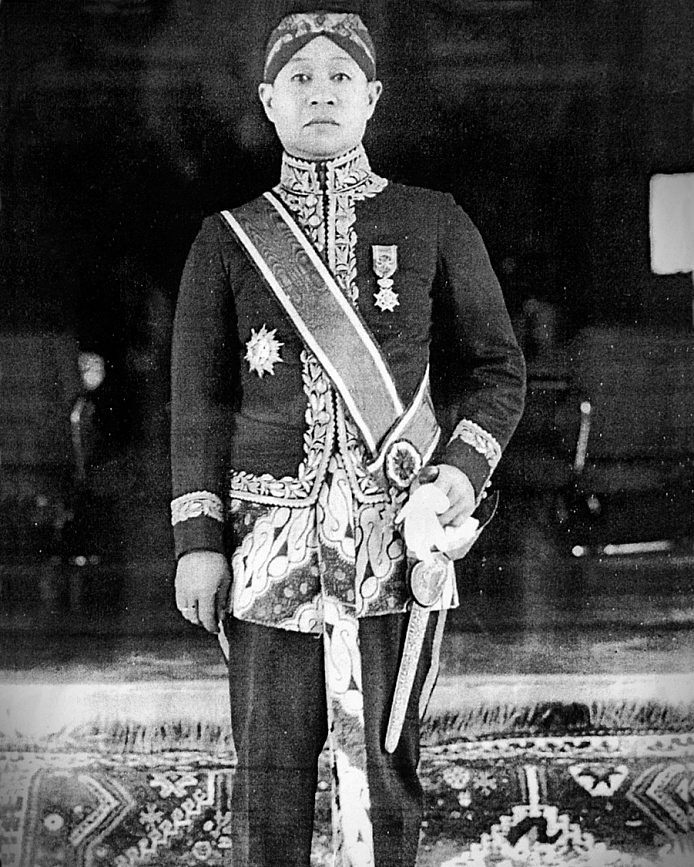|
Sjahrir
Sutan Sjahrir (5 March 1909 – 9 April 1966) was an Indonesian politician, and revolutionary independence leader, who served as the first Prime Minister of Indonesia, from 1945 until 1947. Previously, he was a key Indonesian nationalist organizer in the 1930s and 1940s. Unlike some of his colleagues, he did not support the Japanese during the Japanese occupation and fought in the resistance against them. He was considered to be an idealist and an intellectual. Born to a Minangkabau family, he studied at the University of Amsterdam, and later became a law student at the Leiden University. He became involved in Socialist politics, and Indonesia's struggle for independence, becoming a close associate of the older independence activist Mohammad Hatta, who would later become the first Vice President of Indonesia. During the Japanese occupation of the Dutch East Indies, Sjahrir fought in the resistance. Towards independence on 17 August 1945, he was involved in the Rengasdengklok I ... [...More Info...] [...Related Items...] OR: [Wikipedia] [Google] [Baidu] |
Amir Sjarifuddin
Amir Sjarifuddin Harahap ( EVO: Amir Sjarifoeddin Harahap; 27 April 1907 – 19 December 1948) was an Indonesian politician and journalist who served as the second prime minister of Indonesia from 1947 until 1948. A major leader of the left-wing during the Indonesian National Revolution, he previously served as Minister of Information from 1945 until 1946 and Minister of Defense from 1945 until 1948. Amir was born into the Sumatran aristocracy, and was educated at Leiden University. At Leiden, he became a member of the board of the Gymnasium student association in Haarlem, and was involved in the Batak student organization '' Jong Batak''. He returned to Indonesia due to family troubles, but continued his education at the '' Rechts Hogeschool'' in Batavia. After graduating, he became active in literary and journalist circles, joining the editorial board of the newspaper ''Panorama''. He also became involved with left-wing politics, and led a group of younger Marxist ... [...More Info...] [...Related Items...] OR: [Wikipedia] [Google] [Baidu] |
Sukarno
Sukarno). (; born Koesno Sosrodihardjo, ; 6 June 1901 – 21 June 1970) was an Indonesian statesman, orator, revolutionary, and nationalist who was the first president of Indonesia, serving from 1945 to 1967. Sukarno was the leader of the Indonesian struggle for independence from the Dutch colonialists. He was a prominent leader of Indonesia's nationalist movement during the colonial period and spent over a decade under Dutch detention until released by the invading Japanese forces in World War II. Sukarno and his fellow nationalists collaborated to garner support for the Japanese war effort from the population, in exchange for Japanese aid in spreading nationalist ideas. Upon Japanese surrender, Sukarno and Mohammad Hatta declared Indonesian independence on 17 August 1945, and Sukarno was appointed president. He led the Indonesian resistance to Dutch re-colonisation efforts via diplomatic and military means until the Dutch recognition of Indonesian independence ... [...More Info...] [...Related Items...] OR: [Wikipedia] [Google] [Baidu] |
Proclamation Of Indonesian Independence
The Proclamation of Indonesian Independence ( id, Proklamasi Kemerdekaan Indonesia, or simply ''Proklamasi'') was read at 10:00 on Friday, 17 August 1945 in Jakarta. The declaration marked the start of the diplomatic and armed resistance of the Indonesian National Revolution, fighting against the forces of the Netherlands and pro-Dutch civilians, until the latter officially acknowledged Indonesia's independence in 1949. The document was signed by Sukarno (who signed his name "Soekarno" using the Van Ophuijsen orthography) and Mohammad Hatta, who were appointed president and vice-president respectively the following day. The date of the Proclamation of Indonesian Independence was made a public holiday by a government decree issued on 18 June 1946. Background The beginnings of the independence movement In 1918, the Dutch authorities in the Dutch East Indies established a partly-elected People's Council, the ''Volksraad'', which for the first time gave Indonesian nationalists a ... [...More Info...] [...Related Items...] OR: [Wikipedia] [Google] [Baidu] |
Soedjatmoko
Soedjatmoko (born Soedjatmoko Mangoendiningrat; 10 January 1922 – 21 December 1989), more colloquially referred to as Bung Koko, was an Indonesian politician, intellectual and diplomat. Born to a noble father and mother in Sawahlunto, West Sumatra, after finishing his primary education, he went to Batavia (modern day Jakarta) to study medicine; in the city's slums, he saw much poverty, which became an academic interest later in life. After being expelled from medical school by the Japanese in 1943 for his political activities, Soedjatmoko moved to Surakarta and practised medicine with his father. In 1947, after Indonesia proclaimed its independence, Soedjatmoko and two other youths were deployed to Lake Success, New York, to represent Indonesia at the United Nations (UN). They helped secure international recognition of the country's sovereignty. After his work at the UN, Soedjatmoko attempted to study at Harvard's Littauer Center for Public Administration (now the John F ... [...More Info...] [...Related Items...] OR: [Wikipedia] [Google] [Baidu] |
Indonesian Socialist Party
The Socialist Party of Indonesia ( id, Partai Sosialis Indonesia) was a political party in Indonesia from 1948 until 1960, when it was banned by President Sukarno. Origins In December 1945 Amir Sjarifoeddin's Socialist Party of Indonesia (Parsi) and Sutan Sjahrir's Socialist People's Party (Parsas), both of which had only recently been established, merged to form the Socialist Party. Sjahrir became leader of the combined party. It was popular among young intellectuals and students as well as members of the underground movements led by the two men during the Japanese occupation of Indonesia.Kahin (1952) p158 At the end of 1945 the Socialist Party gained five of the 25 seats on the working committee of the Central Indonesian National Committee, the ''de facto'' legislature.Kahin (1952) p171 Both Sutan and Amir served terms as prime minister, while other Socialist Party members held senior cabinet posts.Simanjuntak (2003) From 1947, divisions appeared between Sutan and Amir as A ... [...More Info...] [...Related Items...] OR: [Wikipedia] [Google] [Baidu] |
Socialist Party Of Indonesia
The Socialist Party of Indonesia ( id, Partai Sosialis Indonesia) was a political party in Indonesia from 1948 until 1960, when it was banned by President Sukarno. Origins In December 1945 Amir Sjarifoeddin's Socialist Party of Indonesia (Parsi) and Sutan Sjahrir's Socialist People's Party (Parsas), both of which had only recently been established, merged to form the Socialist Party. Sjahrir became leader of the combined party. It was popular among young intellectuals and students as well as members of the underground movements led by the two men during the Japanese occupation of Indonesia.Kahin (1952) p158 At the end of 1945 the Socialist Party gained five of the 25 seats on the working committee of the Central Indonesian National Committee, the ''de facto'' legislature.Kahin (1952) p171 Both Sutan and Amir served terms as prime minister, while other Socialist Party members held senior cabinet posts.Simanjuntak (2003) From 1947, divisions appeared between Sutan and Amir as A ... [...More Info...] [...Related Items...] OR: [Wikipedia] [Google] [Baidu] |
Linggadjati Agreement
The Linggardjati Agreement (''Linggarjati'' in modern Indonesian spelling) was a political accord concluded on 15 November 1946 by the Dutch administration and the unilaterally declared Republic of Indonesia in the village of Linggarjati, Kuningan Regency, near Cirebon in which the Dutch recognised the republic as exercising ''de facto'' authority in Java, Madura and Sumatra. Background In 1942, the Japanese occupied the Dutch East Indies. On 17 August 1945, two days after the Japanese surrender, Indonesian nationalist leader Sukarno declared Indonesian independence. The Dutch viewed the Indonesian leadership as collaborators with the occupying Japanese, and were determined to reassert their control over the nation by force. Fighting broke out, which developed into a full-scale war of independence between Dutch forces and Indonesian republicans. By mid-1946, both sides were under pressure to negotiate. In July, 1946, Acting Governor-General of the Dutch East Indies Hubertus van ... [...More Info...] [...Related Items...] OR: [Wikipedia] [Google] [Baidu] |
Ministry Of Foreign Affairs (Indonesia)
The Ministry of Foreign Affairs (, abbreviated as ''Kemlu'') or commonly known by its abbreviations as, is an Indonesian government ministry responsible for the country's foreign politics and diplomacy. The ministry was formerly known as the Department of Foreign Affairs (, abbreviated as ''Deplu'') until 2008 when the nomenclature changed with the enactment of the 2008 State Ministry Act (). Ministry of Foreign Affairs is one of three ministries, along with Ministry of Defense and Ministry Home Affairs, that is explicitly mentioned in the Constitution of Indonesia, hence the president has no authority to dissolve the ministry. According to Article 8 of the Constitution, in case that both the president and the vice president can no longer serve at the same time, the line of succession temporarily falls to a ''troika'' of minister of foreign affairs, minister of home affairs, and minister of defense who would govern concurrently until the succeeding President and Vice Preside ... [...More Info...] [...Related Items...] OR: [Wikipedia] [Google] [Baidu] |
Agus Salim
''Haji'' Agus Salim (; October 8, 1884 – November 4, 1954) was an Indonesian journalist, diplomat, and statesman. He served as Indonesia's Minister of Foreign Affairs between 1947 and 1949. Early life Agus Salim was born Masjhoedoelhaq Salim on October 8, 1884, in the village of Koto Gadang, a suburb of Fort de Kock. His father, Sutan Mohammad Salim, was a colonial prosecutor and judge whose highest rank was chief judge for the indigenous court in Tanjung Pinang. His birth name, which translates into "defender of truth", was changed into Agus Salim early in his childhood. Salim received his elementary education at ''Europeesche Lagere School''; at that time, it was considered a privilege for a non-European child to attend an all-European school. He continued his studies at the ''Hogere Burgerschool'' in Batavia, and graduated with the highest score in the whole Dutch East Indies. Salim's father had applied (and was granted) for his two sons, Agus and Jacob, to be granted equ ... [...More Info...] [...Related Items...] OR: [Wikipedia] [Google] [Baidu] |
Mohammad Hatta
Mohammad Hatta (; 12 August 1902 – 14 March 1980) was an Indonesian statesman and nationalist who served as the country's first vice president. Known as "The Proclamator", he and a number of Indonesians, including the first president of Indonesia, Soekarno, fought for the independence of Indonesia from the Dutch. Hatta was born in Fort de Kock, Dutch East Indies (now Bukittinggi, Indonesia). After his early education, he studied in Dutch schools in the Dutch East Indies and studied in the Netherlands from 1921 until 1932. Early life, family, and early education Early life and family Hatta was born in Fort De Kock (now known as Bukittinggi) on 12 August 1902 into a prominent and strongly Islamic family. His grandfather, Sheikh Abdurrahman, was a respected Naqshbandi-Khalidi murshid in Batuhampar, near Payakumbuh. His father, Haji Mohammad Djamil, died when he was eight months old and he was left with his six sisters and his mother. As in the matrilineal society of Minangka ... [...More Info...] [...Related Items...] OR: [Wikipedia] [Google] [Baidu] |
Wiranatakusumah V
Raden Aria Adipati Wiranatakusumah V (Van Ophuijsen Spelling System, Old Spelling: Raden Aria Adipati Wiranatakoesoemah V; 23 November 1888 – 22 January 1965), commonly shortened to R. A. A. Wiranatakusumah V or just as Wiranatakusumah V, was an Indonesian politician who served as the first and only Wali Negara of Pasundan, Wali Negara of Pasundan, during the Indonesian National Revolution. He was also the first List of Ministers of Home Affairs (Indonesia), Minister of Ministry of Home Affairs (Indonesia), Home Affairs of Indonesia and the second Supreme Advisory Council#List of chairmen, Chairman of the Supreme Advisory Council. He was born on 23 November 1888. He was educated at the Europeesche Lagere School (ELS), the Hogere Burgerschool (HBS), and later the Opleiding School Voor Inlandsche Ambtenaren (OSVIA). His first career in government began when he was a clerk at Wedana Tanjungsari, Sumedang in 1910. One year later, he became a Police Mantri in Cibadak, Sukabumi, and ... [...More Info...] [...Related Items...] OR: [Wikipedia] [Google] [Baidu] |
Minangkabau People
Minangkabau people ( min, Urang Minang; Indonesian or Malay: ''Orang Minangkabau'' or ''Minangkabo''; Jawi: Ù…Ù†Ú ÙƒØ¨Ùˆ), also known as Minang, are an Austronesian ethnic group native to the Minangkabau Highlands of West Sumatra, Indonesia. The Minangkabau's West Sumatran homelands was the seat of the Pagaruyung Kingdom, believed by early historians to have been the cradle of the Malay race, and the location of the Padri War (1821 to 1837). Minangkabau are the ethnic majority in West Sumatra and Negeri Sembilan. Minangkabau are also a recognised minority in other parts of Indonesia as well as Malaysia, Singapore and the Netherlands. Etymology There are several etymology of the term Minangkabau. While the word "kabau" undisputedly translates to "Water Buffalo", the word "minang" is traditionally known as a pinang fruit that people usually chew along the 'Sirih' leaves. But there is also a folklore that mention that term Minangkabau (Minangkabau: ''Minang'' Jawi script: Ù ... [...More Info...] [...Related Items...] OR: [Wikipedia] [Google] [Baidu] |









